
The Hitch-Hiker is a 1953 American film noir thriller co-written and directed by Ida Lupino, starring Edmond O'Brien, William Talman and Frank Lovejoy, about two friends taken hostage by a hitchhiker during an automobile trip to Mexico.

Joan de Beauvoir de Havilland, known professionally as Joan Fontaine, was an English-American actress who is best known for her starring roles in Hollywood films during the "Golden Age". Fontaine appeared in more than 45 films in a career that spanned five decades. She was the younger sister of actress Olivia de Havilland. Their rivalry was well-documented in the media at the height of Fontaine's career.
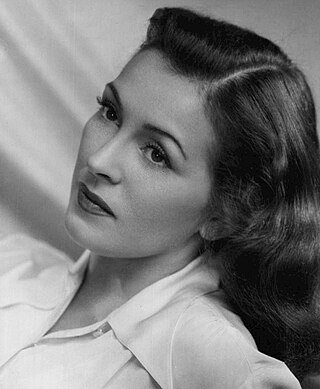
Nancy Kelly was an American actress in film, theater, and television. A child actress and model, she was a repertory cast member of CBS Radio's The March of Time, and appeared in several films in the late 1920s. She became a leading lady upon returning to the screen in the late 1930s, while still in her teens, and made two dozen movies between 1938 and 1946, including portraying Tyrone Power's love interest in the classic Jesse James (1939), which also featured Henry Fonda, and playing opposite Spencer Tracy in Stanley and Livingstone, later that same year. After turning to the stage in the late 1940s, she had her greatest success in a character role, the distraught mother in The Bad Seed, receiving a Tony Award for Best Actress in a Play for the 1955 stage production and an Academy Award nomination as Best Actress for the 1956 film adaptation, her last film role. Kelly then worked regularly in television until 1963, then took over the role of Martha in the original Broadway production of Who's Afraid of Virginia Woolf? for several months. She returned to television for a handful of appearances in the mid-1970s.

Ida Lupino was a British actress, director, writer, and producer. Throughout her 48-year career, she appeared in 59 films and directed eight, working primarily in the United States, where she became a citizen in 1948. She is widely regarded as the most prominent female filmmaker working in the 1950s during the Hollywood studio system. With her independent production company, she co-wrote and co-produced several social-message films and became the first woman to direct a film noir, The Hitch-Hiker, in 1953.
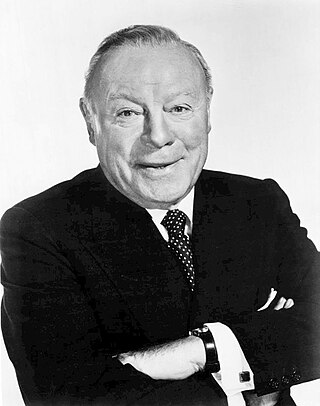
Edmund Gwenn was an English actor. On film, he is best remembered for his role as Kris Kringle in the Christmas film Miracle on 34th Street (1947), for which he won the Academy Award for Best Supporting Actor and the corresponding Golden Globe Award. He received a second Golden Globe and another Academy Award nomination for the comedy film Mister 880 (1950). He is also remembered for his appearances in four films directed by Alfred Hitchcock.
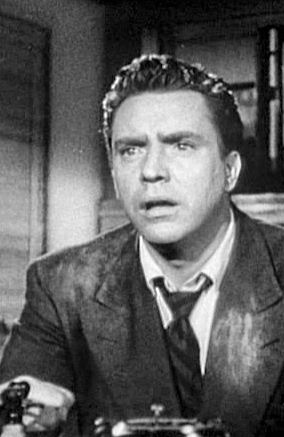
Eamon Joseph O'Brien was an American actor and film director. His career spanned almost 40 years, and he won one Academy Award, two Golden Globe Awards, and two stars on the Hollywood Walk of Fame.
Collier Hudson Young was an American film producer and writer, who worked on many films in the 1950s, before becoming a television producer for such shows as NBC's Ironside and CBS's The Wild, Wild West, as well as the supernatural anthology series One Step Beyond (1959–61).

They Drive by Night is a 1940 American film noir directed by Raoul Walsh and starring George Raft, Ann Sheridan, Ida Lupino, and Humphrey Bogart, and featuring Gale Page, Alan Hale, Roscoe Karns, John Litel and George Tobias. The picture involves a pair of embattled truck drivers and was released in the UK under the title The Road to Frisco. The film was based on A. I. Bezzerides' 1938 novel Long Haul, which was later reprinted under the title They Drive by Night to capitalize on the success of the film.

Sally Forrest was an American film, stage and TV actress of the 1940s and 1950s. She studied dance from a young age and shortly out of high school was signed to a contract by Metro-Goldwyn-Mayer.

Private Hell 36 is a 1954 American crime film noir directed by Don Siegel starring Ida Lupino, Steve Cochran, Howard Duff, Dean Jagger and Dorothy Malone.
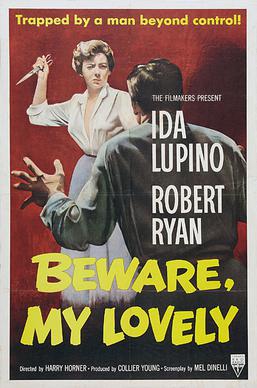
Beware, My Lovely is a 1952 crime film noir directed by Harry Horner starring Ida Lupino, Robert Ryan and Taylor Holmes. The film is based on the 1950 play The Man by Mel Dinelli, who also wrote the screenplay.
The 13th National Board of Review Awards were given on 20 December 1941.

The Man I Love is a 1947 American film noir melodrama starring Ida Lupino, Robert Alda, Andrea King, and Bruce Bennett. Directed by Raoul Walsh, the film is based on the novel Night Shift by Maritta M. Wolff. The title is taken from the George and Ira Gershwin song "The Man I Love", which is prominently featured.

Hard, Fast and Beautiful is a 1951 American drama film directed by Ida Lupino and starring Claire Trevor. It is loosely based on the 1930 novel American Girl by sports-fiction author John R. Tunis, which was an unflattering and thinly veiled fictionalization of the life of the tennis star Helen Wills Moody.

The Hard Way is a 1943 Warner Bros. musical drama film starring Ida Lupino, Dennis Morgan, and Joan Leslie. Directed by Vincent Sherman, it is based on a story by Irwin Shaw which was reportedly based on Ginger Rogers' relationship with her first husband, Jack Pepper and her own mother, Lela.

Never Fear, also known as The Young Lovers, is a 1950 American drama film directed and co-written by Ida Lupino, and produced by Lupino and Collier Young. It stars Sally Forrest, Keefe Brasselle, and Hugh O'Brian.
The Bigamist can refer to the following films:

Bewitched is a 1945 American film noir directed and written by Arch Oboler. The drama features Phyllis Thaxter and Edmund Gwenn.
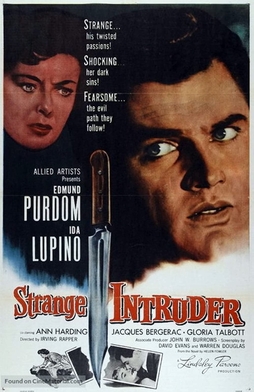
Strange Intruder is a 1956 American film noir crime film directed by Irving Rapper and starring Edmund Purdom, Ida Lupino and Ann Harding. It was based on the 1952 novel The Shades Shall Not Vanish by Helen Fowler. The film was produced by Lindsley Parsons for release by Allied Artists. It was one of a number of noirs featuring Lupino.

Women's Prison is a 1955 American film noir crime film directed by Lewis Seiler and starring Ida Lupino, Jan Sterling, Cleo Moore, Audrey Totter, Phyllis Thaxter and Howard Duff.















